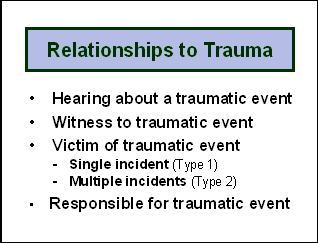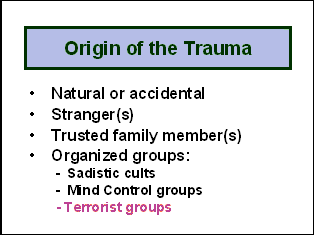Neurobiology of Trauma
and Treatment |
James
Kowal, M.S., LCPC |
| 2. TYPES AND EFFECTS
OF TRAUMA |
|
|
|
The impact
a traumatic event will have on the nervous system is dependent on the person’s
relationship to the trauma. We can be traumatized just by hearing about a trauma from
another person. This is known as "vicarious traumatization." Psychotherapists
sometimes experience this when they work with trauma victims. |
 |
|
|
|
|
The impact of a traumatic event will be
stronger if the individual personally witnessed the event.
The impact increases another level if the person is a victim of the traumatic
event rather than just a witness, and it increases again if the person has been victimized
multiple times.
When the person feels responsible for the traumatic event,
such as being the driver in a fatal automobile accident, the traumatic imprint of the
memory in the nervous system is further strengthened. |
|
Another
factor that effects how the memory of a traumatic event is stored in the nervous system is
the origin of the trauma. For instance, natural or accidental events, although strongly
felt in the nervous system, have somewhat less impact than when the traumatic event was
perpetrated by a stranger. And a stronger impact yet is imprinted when the traumatic event
is perpetrated by a trusted family member. |

|
|
|
An even stronger impact on
the nervous system is generated by sadistic or satanic groups that abuse victims in the
course of rituals or planned torturous events, often repeatedly. Mind control groups
perpetrate traumas for the purpose of gaining control over an individual either through
fear or by causing dissociation in young children. Recently, a third group has been
capturing the news headlines, terrorist groups. We are still coming to understand the
consequences of being victimized by terrorist groups. |
|
|
|
|
|
 |
 |
|
 |
 |
|
|